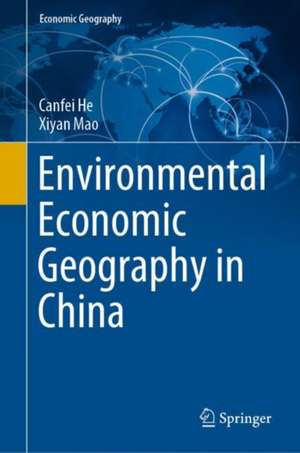Environmental Economic Geography in China: Economic Geography
Autor Canfei He, Xiyan Maoen Limba Engleză Hardback – 18 oct 2020
Preț: 950.52 lei
Preț vechi: 1159.17 lei
-18% Nou
Puncte Express: 1426
Preț estimativ în valută:
181.88€ • 190.41$ • 150.49£
181.88€ • 190.41$ • 150.49£
Carte disponibilă
Livrare economică 17-31 martie
Preluare comenzi: 021 569.72.76
Specificații
ISBN-13: 9789811589904
ISBN-10: 9811589909
Pagini: 304
Ilustrații: XXIV, 304 p. 53 illus., 7 illus. in color.
Dimensiuni: 155 x 235 mm
Greutate: 0.59 kg
Ediția:1st ed. 2020
Editura: Springer Nature Singapore
Colecția Springer
Seria Economic Geography
Locul publicării:Singapore, Singapore
ISBN-10: 9811589909
Pagini: 304
Ilustrații: XXIV, 304 p. 53 illus., 7 illus. in color.
Dimensiuni: 155 x 235 mm
Greutate: 0.59 kg
Ediția:1st ed. 2020
Editura: Springer Nature Singapore
Colecția Springer
Seria Economic Geography
Locul publicării:Singapore, Singapore
Cuprins
Introduction: when economic geography meets the environment.- Developing Environmental Economic Geography.- How Is Geography of Industries Related to Industrial Pollution?.- Do Polluting Firms Favour the Borders of Jurisdictions?.- Do Environmental Regulations Affect Air Quality and SO2 Emissions?.- How Does China’s Economic Transition Contribute to Air Pollution?.- How Does Industrial Dynamics Affect Environmental Pollution?.- Is There A Trade-related Pollution Trap for China?.- How Does Spatial Division of Labour Relate to Industrial Pollution?.- Do Foreign Trade Contribute to Industrial Pollution?.- Does Export Upgrading Improve Urban Environment?.- Summary and implications.
Notă biografică
Dr. Canfei He is a Professor and the Dean of the College of Urban and Environmental Sciences at Peking University (PKU). He earned his Ph.D. degree in geography from Arizona State University in 2001. He was a Visiting Assistant Professor at the University of Memphis during 2001–2003. Dr. He is the Deputy Director of the Peking University–Lincoln Institute Center for Urban Development and Land Policy. He is the Associate Editor of three Chinese journals including World Regional Geography, Geographical Research, and Tropical Geography and is on the editorial board of several international journals, including Economic Geography, Applied Geography, the Geographical Journal, Eurasian Geography and Economics, Growth and Change, Area Development and Policy, and Asia Geographer. He was a section Editor in charge of Industrial Geography for the Wiley-AAG International Encyclopedia of Geography. Dr. He’s research interests include industrial geography, environmental economic geography and evolutionary economic geography, and urban and regional development in China. Dr. He has widely published in international journals and books. He is also the lead Guest Editor of several special issues for Growth and Change (2016), Geojournal (2016), and Small Business Economics (2018). He was granted the Outstanding Young Scientist Award by National Natural Science Foundation of China in 2014 and was entitled the Cheung Kong professorship in 2016 by the Ministry of Education in China. He was listed by Elsevier as one of the most cited researchers in mainland China (social sciences), for six consecutive years (2015–2020).
Dr. Xiyan Mao currently serves as a Research Fellow in the School of Geography and Ocean Science at Nanjing University. He has a Ph.D. in Human Geography and double Bachelor’s Degrees in Geography and Economics from Peking University. Supported by the China Scholarship Council, he had a one-year visiting study at the University of Cambridge.He used to work as a Research Assistant at Peking University-Lincoln Institute Center for Urban Development and Land Policy. He works in the field of environmental economic geography, investigating the human–environment interactions in the dual processes of globalization and localization. His research covers a wide range of aspects, including the environmental effect of trade expansion, industrial evolution, and landscape utilization. Cases in his research reach across multiple spatial scales (from local to global) and diverse typical areas (from less developed and eco-fragile areas to developed but eco-sensitive areas). Research findings have been widely published in international journals.
Textul de pe ultima copertă
This book contributes to the understanding of environment–economy relations from the perspective of economic geography, grounded in the institutional context of China. It demonstrates how classical economic geographies, new economic geographies, and geographies of economic globalization work together to affect the environment. It covers a series of classical topics like industrial location and industrial dynamics and some emerging fields like industrial evolution and global–local interaction and links them to environmental performance in China. The findings in this book echo the call for developing a more comprehensive and systematic research agenda of environmental economic geography. This book offers researchers, graduate students, and advanced undergraduate students in related fields both theoretical and practical considerations of environmental economic geography. It also offers insights into the policy-making relevant to China’s greening efforts.
Caracteristici
Investigates environment-economyenvironment–economy relations from a perspective of economic geography Offers in-depth theoretical and practical considerations of environmental economic geography Explains how the environment interacts with classical economic geographies, new economic geographies, and geographies of economic globalization Highlights the value of a discipline-oriented and policy-relevant research agenda for environmental economic geography














